Introduction, Meaning, Importance, Dimensions, Types, Problems - Equality | 11th Political Science : Chapter 3 : Basic Concepts of Political Science
Chapter: 11th Political Science : Chapter 3 : Basic Concepts of Political Science
Equality
EQUALITY
Introduction
Understanding equality
The idea that human beings are equal is enigmatic.
A nation that seeks equality creates laws to bring change in its society. A law
for equality is inadequate and opposed where pluralistic pattern of society has
become the order of the day whether it’s a developed or under developed nation.
Liberty and rights lead to a third principle in political theory, which is of
equality. Equality determines how rights are to be distributed amongst the
individuals as citizens and groups, both whether equally or unequally. If
unequally then what are the grounds for unequal treatment?. On what ground the
state or the public authority relate with citizens, individuals and groups
unequally. When we talk of equality, we imply different meanings at different
times. In liberal perspective, legal and political
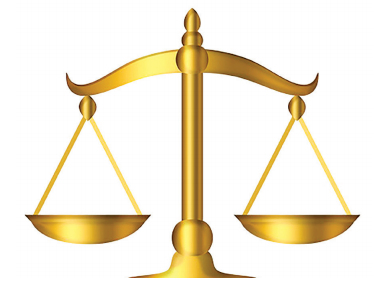
On the other hand, in a socialist and Marxian framework emphasis is
more on economic equality. A feminist would argue that gender equality is vital
while in a caste divided society like India, it could be argued that social
equality is more essential, if other dimensions are to be meaningful.
Learning Objectives
·
Establishing egalitarian society
may look utopian but neglecting it may lead to chaos and anarchy will make
welfare states meaningless.
·
Students from various background
is given an opportunity to understand the concept of equality and inequality in
a balanced manner.
·
The relevance of struggle made by
women, minorities, dalits and linguistic groups for equality is explored.
·
Participation of an individual as
a citizen of a nation in streamlining the
thought of doing justice to equality as a common national goal is pertinent.
Meaning of Equality
Equality, which means state of being equal, is derived from aequs/ aequalis, meaning fair. It signifies ‘having the same rights, privileges, treatments, status, and opportunities’. Equality is treated as something that relates to distributive principle because of which rights, treatments, and opportunities are distributed amongst the beneficiaries in a fair manner. Fairness does not mean all to be treated equally in all circumstances. In fact it very well means unequal treatment for those who are unequal. Essentially it relates to the principle of justice because it requires fair distributive principle .
However those who are equal
should not be treated as unequal and the unequal as equal.
Importance of Equality
Why equality is important?
The most powerful moral and
political ideal that has inspired and guided human society for several
centuries is equality. Every all faith and religion invariably proclaim that
all human beings are creation of God. The concept of equality as a political
ideal invokes the idea that all human beings have an equal worth regardless of
their color, gender, race, or nationality. It urges among human beings equal
consideration and respect because of the common humanity. The belief in this
notion of humanity led us to the declaration of universal human rights.
Equality became the slogan in the
struggle against states and social institutions which uphold inequalities of
rank, wealth, status or privilege, among people during the modern period. In
the eighteenth century, the French revolutionaries used the slogan ‘Liberty,
Equality and Fraternity’ to revolt against the landed feudal aristocracy and
the monarchy. The demand for equality was also raised during anti-colonial
struggle in Asia and Africa during the twentieth century. It continues to be
raised by struggling group such as women or dalits who feel marginalized in our
society.
Equality now has become a widely
accepted ideal which is embodied in the constitutions and laws in the world.
However the most visible and disturbing factor around us in the world and as
well in our society is inequality. We can see in country slums existing side by
side with luxury housing, schools which may lack even drinking water facilities
or toilets, waste of food as well as starvation. There are visible difference
between what law promises and what we see around us.
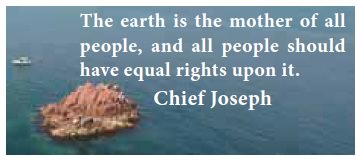
India through its constitution
attempts to fill the gap between equal and unequal with the principle of
equality as enshrined in the constitution.
Dimensions of Equality
What is Equality?
We live amidst distinctions between human beings on
the ground of race and color, knowing well it is unacceptable. In fact such
distinctions violate our intuitive understanding of equality which tells us
that all human beings are entitled to similar respect and consideration because
of their common humanity. No society treats all its members in exactly the same
way under all circumstances. There can be no identity of treatment so long as
men are different in wants, capacities, and needs. Injustice arises much from
treating unequal’s equally as from treating equals unequally. And most
importantly apart from the natural inequalities, there are inequalities created
by the society- inequality based upon birth, wealth, knowledge and religion.
The movement of history is not
towards greater equality because as fast as we eliminate one inequality, we
create another one: the difference being that the one we discard is
unjustifiable while the one we create seems reasonable. Hence the social
political, educational equalities are always in need of reinforcement and reinterpretation
by every new generation. Like liberty, equality can also be understood in its
negative and positive aspects. Negative equality was associated with the end of
such privileges and positively it meant the availability of opportunity.

According to Laski equality means:
·
Absence of privileges. It means
that will of one is equal to the will of any other. It means equality of rights
·
Adequate opportunities are laid
open to all. Opportunities should be given to all to realize the implications
of his personality.
·
All must have access to social
benefits and no one should be restricted on any ground. The inequalities by
birth or because of parentage and hereditary causes are unreasonable
·
Absence of economic and social
exploitation
A state divided into a small
number of rich and large number of poor will always develop a government
manipulated by the rich to protect the amenities represented by their property.
- Harold laski
According to Barker, the concept of equality means
v Fundamental
equalities of all
v Equality
of opportunity
v Equality
of conditions where there is an attempt to make the conditions of life equal
v Equality
of outcome of results
Case Study
MUKILAN TOO HAS A DREAM …
Mukilan works in a Brickkiln in
Silaiman, near Madurai. The following is an extract of the interview:
Correspondent: What is your day life?
Mukilan:
I wake up at 6.00 a.m. and go to the
Brickkiln to help my parents. from 11.00 a.m. to 1.00 p.m. I am at Bridge
Course entry (run by a non-government organization) Then after lunch at about
3.00 p.m. I again to help my parents at the Brickkiln and by 6.30 p.m. I return
to my nut. I have been enrolled in the school nearby, so now days I go to
school by 10.00 a.m. come back by 3.00 p.m. It is difficult for me to attend
school regularly, as our family income is very low and sometimes I have to sell
peas and nuts.
Correspondent:
Tell us about your family. What do
your parents do?
Mukilan:
My mother is a homemaker/ my father
works in a Brickkiln. I feel sad that I cannot spend time with my two elder
brothers, since they stay in Kolkata. They are day laborers. My brothers, Raja
Pandi(19 years) and Muniasamy(16 years) left school. When they were in Std’s IV
and VI respectively. Both had worked in Brickkilns before me. I have two
sisters also. Tamil Selvi(10 years), who is studying in Std III at the
Government School. My other sister, Yazhini , is now 22 years and is married.
She studied up to Std V.
Correspondent:
When you grow up, What would you like
to be?
Mukilan:
I always wanted to be a doctor or to
work in a pharmaceutical company, since that helps people.
Correspondent: Do you have dreams?
Mukilan:
My dream to be live
in a good house and to travel in a car.
Equality of opportunities
The concept of equality implies that
all people as human being are entitled to the same rights and opportunities to
develop the skills and talents, to pursue their goals and ambitions. However,
it is not the lack of equality of status or wealth or privilege that is
significant but the inequality in peoples access to such basic goods, as
education, health care, safe housing that make for an unequal and unjust
society.
Natural inequality and social inequality
Natural inequalities are those
that emerge between people as a result of their different capabilities and
talents. These kinds of inequalities are different from socially produced
inequalities which emerge as a consequence of inequalities of opportunity or
the exploitation of some groups in a society by others. Natural inequalities are
considered to be the result of the different characteristics and abilities with
which people are born with. Social inequalities on the other hand are those
created by society. Unequal treatment in society based on race, color, gender
and caste are of social inequalities. Women were denied equal rights for
centuries similarly, Blacks were treated as slaves until the institution of
slavery was questioned . Even people born with disability with modern
technological innovations are able to contribute like any other normal person.
Stephen Hawkings, contribution despite his disability is remarkable. Political
philosophers have contributed various theories, philosophies and ideologies for
further understanding and innovation to place society on equal platform.
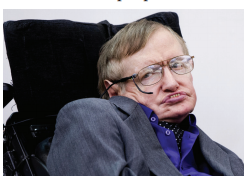
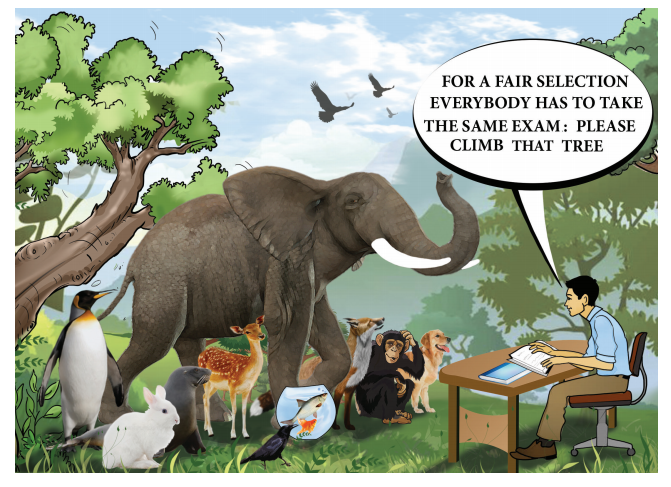
Read the cartoon and identify the
context of what type of inequalities are represented in this cartoon?
Let us know the dimensions of equality
What are the different types of equality?
Civil Equality
·
No discrimination
(religion, belief, etc)
Political Equality
·
Access to authority
·
Voting
Social Equality
·
Opportunity
·
Privileges
Natural Equality
·
Natural rights
Economic Equality
·
Wealth

Social equality means no one
should be discriminated in the distribution of rights, privileges and
opportunities based on birth, caste, religion, race, colour, gender or social
status. Each one should be given equal opportunity to develop his personality.
Social equality implies few important aspects. They are: removal of
discrimination based on social status, absence of special privileges to few and
finally ensuring equal opportunity in terms of acquiring education. History
reveals that certain forms of social inequality world over were rejected and
the demand for social equality are being raised. Slavery in South Africa, west
Asia and America, untouchability in India, Racial discrimination n in USA against
Blacks, Policy of Hitler against Jews and gender related inequalities and
discrimination are few examples of social inequalities with countries world
over are trying to redress with the policy of government. Civil rights movement
in United States of America for Blacks by Martin Luther king Jr and
Dr.B.R.Ambedkar’s effort for the social equality for the lower caste in India
are few examples that set movement for social equality in motion.
Martin Luther king
Jr. was an unquestioned leader of nonviolent civil Rights movement in USA.
Civil right movement was a struggle for social justice happened
during the 1950s and 1960s for blacks to gain equal rights under the law in the
United states. Similarly Dr.B.R.Ambedkars liberation movement for millions of
dalits was a historic movement in India. A seed for the movement for social
equality.
The American declaration
announced that ‘all men are created equal’, French declaration of Rights of Man
and citizens declared that ‘men are born and always continue free and equal in
their rights. The United Nations organization on 10th December, 1948, declared
the charter of human rights which laid stress on social equality. However
according to the report of Amnesty International, these rights have been
violated frequently by a number of countries in the past and still efforts are
being made to address the issues of social inequality world over.
(ii) Civil Equality
The word ‘civil’ is derived from the Latin word civilis or civis, which means citizen. Civil equality means equality in which each citizen is provided with equal civil rights and liberties. Civil equality consists of similar civil liberties and civil rights by all the citizens. Civil laws should treat all the individuals equally.
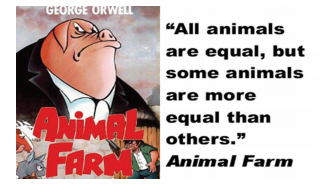
There should not be any
discrimination of superior and inferior, the rich and the poor, caste and
creed, colour and race, clans and tribes, groups and classes. In England, Rule
of law is in force and in the eyes of the rule of law all are equal. Equal
treatment is given to all by the rule of law. It is from the British
constitution India had adopted the rule of law.
(iii) Political Equality
Political Equality means equal
right of all citizens, without any distinction, allowed to participate in the
affairs of the state. Political right of all citizen is ensured through
universal adult franchise. The other factors that ensure the political rights
of citizens are:
·
Right to vote
·
Right to contest in election
·
Right to hold public office
·
Right to petition the government
and criticize public policy
Political equality guarantees the
enjoyment of similar political rights to all citizens. Universal adult
franchise is a means to this end. Political equality is actually the test on
the experiments of democracy. It is also believed that political equality in
itself is not adequate to disperse political power, it also needs
socio-economic equality to achieve political equality.
(iv) Economic Equality
Economic equality is justifiable
only when all people have reasonable opportunities to develop themselves fully.
Economic equality is meaningful only when there is an adequate scope for
employment, reasonable wages, adequate leisure and equal share in the
management of economic concern. Professor Laski explains economic equality,
“Political equality is, therefore, never real unless it is accompanied with
virtual economic liberty; political power otherwise is bound to be the
hand-maid of economic power”.
Economic equality here means the
provision of equal opportunities to all so that they may be able to make their
economy progress. Ideologically this is possible in Socialism and not in
Capitalism.
(v) Equality of opportunity and education
Equality of opportunity and
education means, all the citizens should be given equal and similar opportunities
by the state. All the citizens should have similar chances to receive education
and equal opportunities be given to develop their personality. Social
inequalities such as race, caste, religion, language, rich, poor and gender
based discrimination should be eradicated. In India, constitution provides
provisions for equal opportunities and equal education.
Relation between
Liberty and Equality
There is no value of liberty in
the absence of equality. They are understood from different perspectives by
political thinkers such as Lord Acton , De Tocqueville and
Harold. J.Laski. Lord Acton and Alexis De Tocqueville were the
ardent advocates of liberty. They were of the opinion that where there is
liberty, there is no equality and vice versa.“The passion for equality made vain
the hope for liberty.”- Lord Acton Professor H.J.
Laski believed that liberty and equality should go together. If an
individual is given unrestrained liberty to do whatever he likes, he may cause
harm to others. Unrestrained liberty will bring only chaos in the society. In
the nineteenth century, the Individualists wrongly interpreted the term
Liberty. They did not attach any importance to economic equality and laid
stresses on Laissez Faire to be adopted by the government said Laski.
Professor H.J. Laski in his remark
said that ‘Where there are rich and poor, educated and uneducated, we always
find a relation of master and servant’.
Laissez faire is an economic
system in which transaction between private parties are free from government
intervention such as regulation, privileges, tariffs and subsidies.
Adam Smith was the
ardent supporter of the view that the Individualists maintained that
there should be a free competition between the capitalists and labor leaders.
They did not want the government to involve in the economic matters. Formula of
Demand and Supply was adopted. It was expected that the economic difficulties
will be removed by this formula, but resulted in dangerous consequences in
Europe.
The capitalists exploited the
opportunity to the core and as a result of it, the gap between rich poor got
wider. The labor class was worst affected and the reaction against
individualism resulted in the dawn of Socialism. Socialism rose to condemn and
refute the principles of Individualism. The transition made clear that Liberty
is meaningless in the absence of economic equality.
Individualism is a political and social philosophy that emphasizes the moral worth of the
individual.
Socialism is a political and economic theory the advocates the means of production,
distribution and exchange should be owned or regulated by the community as a
whole.
Economic equality is essential
for the existence of political freedom. Otherwise it will be a capitalist democracy in which the laborers will have right to vote but they will not get their purpose served.
Hence liberty is possible only in socialistic
democracy where liberty and equality go together. There is only one
solution to liberty. It lies in equality. Thus liberty and equality are
complimentary to each other said Pollard.
Problems with Equality
·
Variety of meanings: equal
treatment, equal outcomes, equal opportunities (and lots of shades of meaning
within these broad categories)
·
Conflicts between each type:
equal treatment prevents equal outcomes; equal outcomes violates equal
treatment.
·
Equal opportunities conceptually
flawed by problem of regression: is education and training an outcomes or an
opportunity? Is an entry level job an outcome or an opportunity?
·
Equal treatment reinforces
difference in opportunities and lacks a theory of what should count as a
relevant difference and irrelevant differences eg obesity.
·
Equal outcomes are not in fact
generally desired as a goal: fairness rather than egalitarianism is the model
of social justice being sought. Equality is an aspect of fairness, but also
inequality is desired on the ground of fairness to reward ‘merit’ and to
accommodate to choose a way of life.
How Equality can be promoted
The difference as we understood between liberals
and socialist lead us to the desirable way of achieving the goal of equality.
The wide debate on the means of promoting equality may lead us to few methods.
They are,
·
Establishing formal equality
·
Equality through Differential
Treatment
·
Affirmative action
Perspectives of various Ideologies on Equality by Andrew Heywood
Liberals believe that people
are ‘born’ equal in the sense that they are of
equal moral worth. This implies formal equality, notably Legal and political
equality of opportunity, but social equality is likely to be purchased at the
expense of freedom and through the penalizing of tablet. Nevertheless, whereas
classical liberals emphasize the need for strict meritocracy and economic
incentives, modern liberals have argued that genuine equal opportunities
require relative social equality.
Conservatives have traditionally viewed society as natural hierarchical and have thus dismissed equality as an abstract and unachievable goal. Nevertheless, the new right evinces a strong industrialist belief in equality of opportunity while emphasizing the economic benefits of material inequality.
Socialist regards equality as a
fundamental value and in particular, endorse social
equality. Despite shifts within social democracy towards a liberal belief of
opportunity, social equality, whether in its relative (social democratic) or
absolute (communist) sense, has been seen as essential to ensuring social
cohesion and fraternity, establishing justice or equity and enlarging freedom
in a positive sense.
Anarchists place a particular
stress upon political equality, understood as
an equality and absolute right to personal autonomy, implying that all forms of
political inequality amount to oppression.
Anarcho-communists believe in absolute social
equality achieved through the collective ownership of productive wealth.
Fascists believe that
humankind is marked by racial inequality, both between
leaders and followers and between the various nations or race of the world.
Nevertheless, the emphasis on the nation or race implies that all members are
equal, at least in terms of their core identity.
Feminists take equality to mean
sexual equality, in the sense of equal rights
and equal opportunities (liberal feminism) or equal social, economic power
(social feminism?) irrespective of gender. However, some radical feminists
argued that the demand for equality may simply lead to women being
‘male-identified’.
Ecologist advance the notion of
bio centric equality, which emphasizes that
all life forms have an equal right to ‘live and blossom’. Conventional notions
of equality are therefore seen as anthropocentric, in that they exclude the
interest of all organisms and entities other than humankind.
Heywood, Andrew. (2004) Political Ideologies: An Introduction, 4th ed. New York: Macmillan.
Ways of establishing formal Equality
Social, economic and political inequalities all
over the world have been protected by customs and legal systems that prohibited
some sections of society from enjoying certain kinds of opportunities and
rewards. Poor were denied of right to vote. Women were not allowed to be a
carrier oriented women in some part of the world. The caste system in india
prevented people from the lower castes from doing anything except manual
labour. In some countries only some families can occupy important positions.
Equality cannot be achieved unless these privileges are stalled.
![]()
For ages these systems have the sanction of law,
hence for achieving equality government intervention is needed by means of law.
Our constitution as a fundamental or supreme law of the land does it. The
constitution of India prohibits discrimination on the grounds of religion,
race, caste, sex or place of birth. Our constitution also abolishes
untouchability. Most of the modern states and democratic governments have
incorporated in their constitution the principle of equality.
Equality in Indian Constitution
The concept of Equality in Indian constitution
The Indian constitution under
article 14 provides for equality before law or the equal protection of laws to
all persons. This is a statement of formal equality and gives meaning to what
preamble seeks to ensure in terms of ‘equality of status and of opportunity’.
This also means that laws of the land will apply to all equally and there
should not be discrimination on grounds of birth, caste, color, gender,
language, race, religion, etc. in fact article 15 of the constitution
substantiates article 14 further by prohibiting any such discrimination.
Equality before law and equal
protection of law have been further strengthened in the Indian constitution
under article 21. It ensures that ‘No Person shall be deprived of his life or
personal liberty except according to procedure established by law. This means
that a reasonable fair and just procedure should be followed for depriving a
person of his personal liberty and life. It admits no arbitrariness,
discriminatory procedure or unequal treatment for different individuals’.
Right to Equality (Article 14-18)
v Equality
before law (Article 14)
v Prohibition
of discrimination on grounds of religion (Article 15)
v Equality
of opportunity in matters of public employments(Article 16)
v Abolition
of Untouchability (Article 17)
v Abolition
of titles (Article 18)
How Equality can be achieved through differential treatment?
It is necessary sometime to treat
people differently in order to ensure that they can enjoy equal rights. Certain
differences may have to be taken into account for this
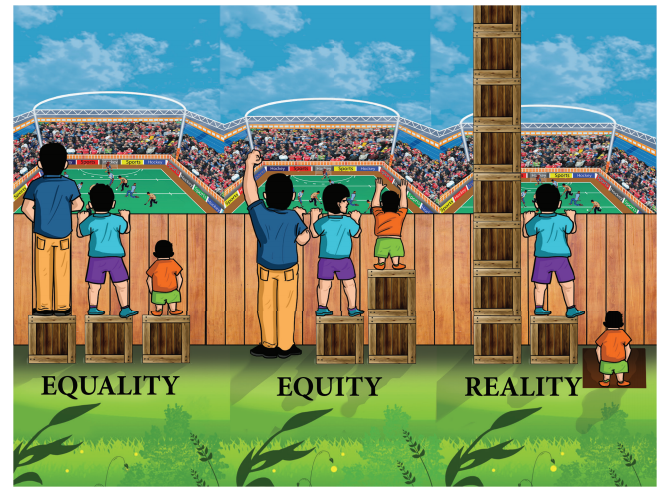
Some special consideration for the disabled
and protection for women employees especially in the corporate and IT
industries when they travel amidst work in the night are provided. These acts
should not be treated as an infringement of equality but an enhancement of
equality. Similarly some of the policies are needed to overcome the hindrances
of equality by the government. For example, India follows the principle of
reservation and other countries follow affirmative action.
Affirmative action Perception of Affirmative action
Affirmative action implies that
it is not sufficient to establish formal equality by law. In order to eliminate
deep rooted inequalities, some positive measures are necessary and such
positive measures could minimize and eliminate slowly the entrenched forms of
social inequalities. Most of the policies of affirmative action are thus
designed to correct the cumulative effect of past inequalities. In our country
we have adopted a policy of quotas or reserved seats in education and jobs to
provide equality of opportunity to deprived groups, and this has been the subject
of considerable debate and disagreement.
Affirmative Action Definition
A policy or program providing advantage for people of a minority
group who are seen to have traditionally been discriminated against, with the
aim of creating a more egalitarian society through preferential access to
education, employment, health care, social welfare, etc
The policy has been defended on the grounds that
certain groups have been victims of social prejudice and discrimination in the
form of exclusion and segregation. Therefore in the interest of creating an
egalitarian and just society they need to be given special protection and help.
However these measures of affirmative actions are time bound and temporary. It
is expected that these special consideration will enable these communities to
overcome existing disadvantages with others on equal terms.
![]()
The critics of positive discrimination contend that
the provision of reservation and quota arbitrarily denies the rights of other sections right to equal
treatment. They think that reservations are of reverse discrimination where the
principle of equality remained questioned. Equality is meant for treating all
equals instead it creates a distinction among individuals on the basis of caste
and racial prejudices. Hence this theorist wants to do away with social
distinctions that divide society. Whatever the debate may be the fact is health
and education for rural and slum children are glaringly deprived while
comparing with the children in elite schools.
These students face hurdles in
gaining access to special coaching and fees for professional courses may also
be high. Hence they cannot compete on equal terms with the more privileged
sections. We all know that such social and economic inequalities of this kind
remain as hinder to equal opportunities. Theorists of today acknowledge this
but what they contest is not the goal of equal opportunity but the policies
that the state should pursue to achieve the goal of equality.
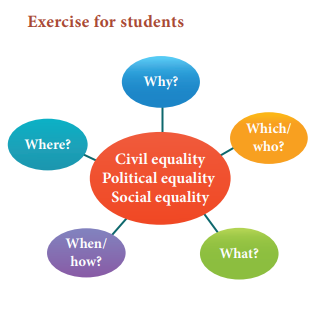
Case Study
Economic Inequality and Arab Uprising
Issues like illness, hunger and thirst are often both cause and consequences. The cause of poverty are often related: one problem causes other. For example lack of safe clean water causes bad sanitation, which causes disease and disease can result in inability to work, which leads to poverty, hunger and so on.
Poverty is an issue that can threaten the stab ility of the country. For example, the Jasmine Revolution takes the authoritarian rulers in Tunisia by surprise and triggers anti-government protests across the Arab world. The 29-day-long struggle ended Ben Ali’s 23- year rule. The self-immolation by Mohammad Bouazizi, an unemployed man who was harassed by the police in the Tunisian town of Sidi Bouzid on December 17, 2010 was the spark the ignited the Arab street. It first started the “Jasmine “Revolution (Jasmine is Tunisia’s national flower). The residents of the sleepy town, who were already angry about routine police brutality and the lack of economic opportunities, took to the streets spontaneously with “a rock in one hand and a cellphone” in the other…
A great wave of anger, frustration, defiance and democratic demand is sweeping across the Arab world. The upsurge in Arab world is not simply about democracy versus dictatorship. It is also a revolt against a manifestly unjust economic order.
Related Topics